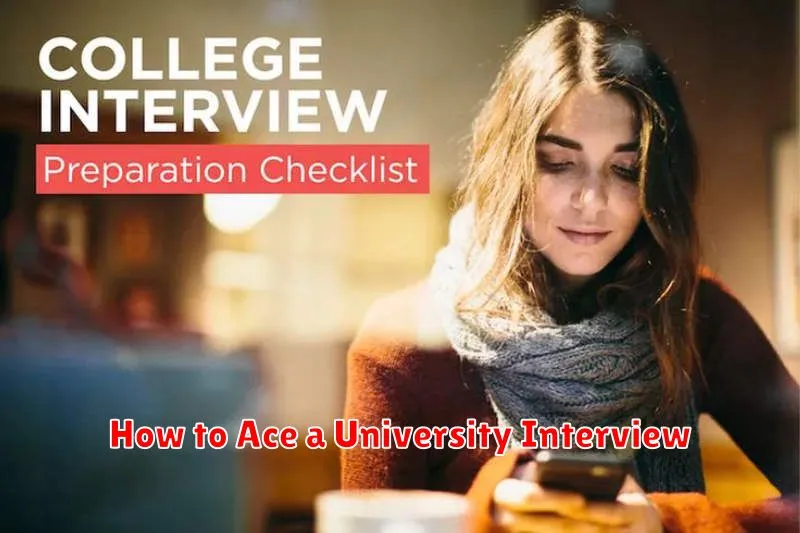Securing a place at your dream university hinges on more than just stellar grades and a compelling application. The university interview is a crucial step in the admissions process, offering you a unique opportunity to showcase your personality, passion, and potential. This interview serves as a platform to demonstrate why you are the ideal candidate, highlighting your strengths and aligning your aspirations with the university’s values. Mastering the art of the university interview can significantly boost your chances of acceptance. This guide will equip you with the essential knowledge and strategies to ace your university interview and pave the way to academic success.
From understanding common university interview questions to crafting compelling responses and perfecting your delivery, we’ll delve into every facet of the interview process. Whether you’re navigating a traditional in-person interview or a virtual one, this comprehensive guide provides actionable tips and techniques to help you present your best self. Learn how to effectively communicate your academic achievements, extracurricular involvement, and future goals, making a lasting impression on the admissions committee. Prepare to ace your university interview and confidently embark on your higher education journey.
Understanding the Purpose of Interviews
University interviews serve a distinct purpose beyond simply reviewing your application materials. They provide the admissions committee with a more holistic understanding of you as an individual.
For the University:
- Assess your communication skills and how clearly you articulate your thoughts.
- Gauge your genuine interest in their specific program.
- Evaluate your personality and how well you might fit into their academic community.
- Confirm information presented in your application and seek clarification on any ambiguities.
For You:
- Demonstrate qualities that may not be apparent in your written application, such as enthusiasm and interpersonal skills.
- Ask questions and gain a deeper understanding of the program and university culture.
- Reinforce your commitment to the institution and showcase your potential to contribute to their community.
Researching the University and Program
Thorough research is crucial before your university interview. Understanding the university’s values and the program’s specifics demonstrates your genuine interest and preparedness.
Focus your research on these key areas:
- University Culture: Explore the university’s mission, vision, and values. What are their core principles? How do they support student success?
- Program Details: Examine the program curriculum, research opportunities, and faculty expertise. What specific courses excite you? Which professors align with your academic interests?
- Recent Achievements: Look for news articles or university publications highlighting recent accomplishments, breakthroughs, or awards related to the program or department. This demonstrates your awareness of their current activities.
By investing time in research, you’ll be equipped to ask informed questions during the interview, demonstrating your genuine interest and making a positive impression.
Common Questions and Ideal Responses

University interviews can be nerve-wracking, but preparing for common questions can significantly boost your confidence. Here are some examples and how to approach them:
“Tell me about yourself.”
This is your chance to showcase your personality and connect your experiences to your academic goals. Briefly summarize your background, highlighting key achievements and interests that align with the university’s values. Focus on what makes you unique and demonstrates your passion for learning.
“Why are you interested in this program?”
Research is crucial. Mention specific courses, faculty, or research opportunities that excite you. Connect these elements to your long-term aspirations. Demonstrate genuine enthusiasm and a clear understanding of the program’s offerings.
“What are your strengths and weaknesses?”
Be honest and self-aware. Choose strengths relevant to academic success, like time management or critical thinking. For weaknesses, select something you’re actively working to improve. Frame your response positively, showing a commitment to personal growth.
“Where do you see yourself in five years?”
Your answer doesn’t need to be overly specific, but it should demonstrate ambition and align with the field of study. Express your desire to contribute meaningfully and continue learning. This shows the interviewer you’re forward-thinking and invested in your future.
Body Language and Communication Style
Your body language plays a crucial role in how you are perceived during an interview. Maintain professionalism by sitting upright, making appropriate eye contact, and offering a firm handshake. Avoid fidgeting or slouching, as these can signal nervousness or disinterest.
Active listening is essential. Pay close attention to the interviewer’s questions and respond thoughtfully. Clear and concise communication is key. Articulate your thoughts effectively and avoid using jargon or slang.
Project confidence through your tone of voice and body language. Speak clearly and maintain a steady pace. While it’s important to be confident, avoid being overly assertive or interrupting the interviewer.
A genuine and enthusiastic demeanor can leave a positive impression. Smile when appropriate and express your genuine interest in the university and the program you’re applying for.
Handling Unexpected Questions

University interviews often include unexpected questions designed to assess your critical thinking, problem-solving skills, and ability to think on your feet. Don’t panic if you encounter a question that throws you off guard. The interviewer isn’t necessarily looking for a “right” answer, but rather observing your approach.
Take a deep breath and pause to gather your thoughts. It’s perfectly acceptable to ask for a moment to consider your response. You can say something like, “That’s an interesting question. Let me think about that for a moment.”
If the question is unclear, don’t hesitate to ask for clarification. Rephrasing the question in your own words can also buy you some time and ensure you understand what’s being asked. For example, you could say, “So, if I understand correctly, you’re asking about…”
Even if you don’t have a definitive answer, verbalize your thought process. Explain how you would approach the problem, the factors you would consider, and any potential solutions that come to mind. This demonstrates your analytical abilities and willingness to engage with challenging concepts.
Dress Code and Presentation
First impressions are crucial. Your attire should communicate professionalism and respect for the institution. Aim for business formal or business casual attire. Avoid overly casual clothing like jeans, t-shirts, and athletic wear.
For business formal, a suit (matching jacket and trousers or skirt) is recommended. Choose neutral colors such as navy, gray, or black. A collared shirt or blouse paired with appropriate shoes completes the look. For business casual, you might opt for dress pants or a skirt with a collared shirt, blouse, or sweater. A blazer is a good addition.
Beyond clothing, overall presentation matters. Ensure your hair is neat and your shoes are clean. Minimize accessories and avoid strong fragrances. Confidence in your appearance will contribute to your overall composure during the interview.
Following Up After the Interview
A thoughtful follow-up after your university interview demonstrates professionalism and continued interest. Sending a thank-you note is a crucial step in this process.
Within 24 hours of your interview, send a personalized thank-you email to each interviewer. Reiterate your enthusiasm for the program and briefly mention a specific detail from your conversation to show you were engaged. This demonstrates your genuine interest and helps you stand out from other applicants.
While following up is important, avoid excessive contact. Resist the urge to repeatedly inquire about the admission decision. The university will contact you when they have an update.

